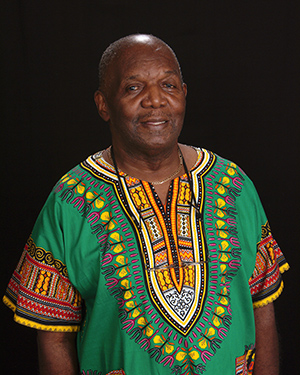The Poet Preacher
For four decades, STH alum has been fighting, and writing, to end prejudice

In January 1957, 18-year-old Theodore Lockhart was en route from his hometown of St. Petersburg, Fla., to an Air Force base in Japan. Planning to follow in his uncle’s military footsteps, Lockhart had signed up for a four-year term in the US Air Force. During the trip to Japan, he felt the call to ministry “thundering in my consciousness”—but he’d have to wait four years to answer the call.
Religion had always been a source of strength for Lockhart (CAS’65, STH’68). “Growing up in the South meant that my world was full of real trouble and life-threatening danger for violating the laws and customs of racial segregation,” he says, but it was through an expression of Christianity “specific to the life of Negro Christians under segregation that I was able to endure segregation in the South and deal with its manifestations in the North.”
Lockhart’s career as a United Methodist minister spanned four decades and saw historic changes in the church and in American society. But it started out with a challenge that helped shape the course of his life. Methodist Church officials offered to support Lockhart, newly discharged from the military, in his spiritual journey and encouraged him to apply to Boston University with the promise of financial aid. Once he was accepted, however, the funds fell through. He got by at BU on his earnings from a summer job, but when the money ran out, he told his mother he was coming home. Intending to take out a second mortgage on her house, Vivian Lockhart asked Rev. Louise Beaty, the white minister of First Unity Church in St. Petersburg, for a reference to the bank. Instead, Beaty wrote a check. When Lockhart met Beaty for the first time at a church service over Christmas break, “she smiled and gave me a wink,” Lockhart wrote in a presentation to St. Petersburg College students. “Imagine that, a white woman and black man exchanging smiling winks in the days of Jim Crow segregation!”
After graduating, Lockhart strove to give other African Americans a leg up in education, as Beaty had given him. As assistant dean of Boston College’s Black Talent Search, BC’s first effort at racial inclusion in the wake of the assassination of Martin Luther King, Jr. (GRS’55, Hon.’59), Lockhart helped African American students enroll and excel at BC. He also served on its Black Forum, a program dedicated to establishing a black studies department, a new concept among universities eager to recruit African American students. Lockhart was equally committed to fostering inclusiveness in the United Methodist Church. In 1969, he became chairperson of the New England Conference Board of Christian Social Concerns and authored a resolution calling for the appointment of minorities to churches within the conference.
“There’s plenty good room…”
The African American experience is fundamental to Lockhart’s career—and to the poetry he has been writing since he was a child. His recent book, Before Blackness, Lying After Truth, In Rabbitude, and Other Poems (Dog Ear Publishing, 2013), includes poems from the 1960s to 2011 that are infl-uenced by black folk culture, the black consciousness movement, and events like King’s assassination, as in “April’s Repetition”:
“Ted! Ted!
They’ve shot Martin Luther King Junior!
They’ve killed him dead!”
Well I’ll be damned.
I’ll be goddamn!
Another man done gone!
Another man done in!
Another man done!
Another Black Man!
Although Lockhart has always been invested in African American rights, in 1996 he took up another civil rights battle he never expected to join. He was serving as minister at Union United Methodist Church (UUMC) in Boston’s South End—an area that was seeing an influx of gay residents at the time—when a church member asked him about the United Methodist Church’s position on homosexuality. Several members were shocked by the church’s noninclusive position and formed a task force that over the next four years looked into UUMC’s becoming a reconciling church. Their mission statement drew upon the Bible and African American spirituals: “There’s plenty good room, plenty good room in ma Father’s Kingdom, plenty good room, plenty good room—just choose your seat and sit down.” In 2000, UUMC became the first official African American United Methodist reconciling church.
Lockhart’s influence has reverberated at UUMC in the years since his retirement. The church holds discussions about AIDS, features a “Happy Pride” sign on the front lawn, and hosts a gospel brunch during Gay Pride Weekend. It was also the first African American church to hold Boston’s Annual Gay Pride Interfaith Prayer Service. In his retirement, he has remained an active supporter of inclusion, serving as interim pastor at one of Florida’s two reconciling churches. And his voice in the African American community is still powerful in poems inspired by recent events, such as the shooting of Trayvon Martin:
What’s the right pace for me to run
You who hold the gun.
Should I run at the joggers pace
Or do you want my sprinter race.
In his roles as both a preacher and a poet, Lockhart says, he “attempts to help others see things as they show up in lived experience.”
Lara Ehrlich can be reached at lehrich@bu.edu.
A version of this story was published in the spring 2014 edition of Focus
Comments & Discussion
Boston University moderates comments to facilitate an informed, substantive, civil conversation. Abusive, profane, self-promotional, misleading, incoherent or off-topic comments will be rejected. Moderators are staffed during regular business hours (EST) and can only accept comments written in English. Statistics or facts must include a citation or a link to the citation.